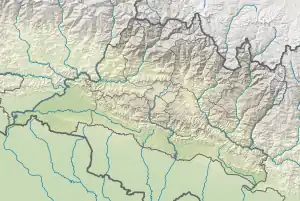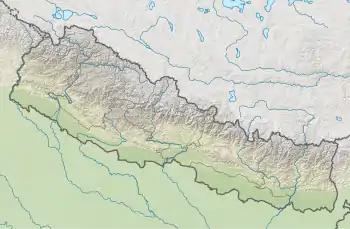Chaunrideurali (RM)
चौरीदेउराली गाउँपालिका | |
|---|---|
 Chaunrideurali (RM) Location  Chaunrideurali (RM) Chaunrideurali (RM) (Nepal) | |
| Coordinates: 27°33′N 85°49′E / 27.55°N 85.81°E | |
| Country | |
| Province | Bagmati |
| District | Kavrepalanchowk |
| Wards | 9 |
| Established | 10 March 2017 |
| Government | |
| • Type | Rural Council |
| • Chairperson | Mrs.Renuka Chaulagain |
| • Vice-chairperson | Mr.Sher Bahadur Lama |
| • Information Technology Officer | Mr.Bishnu Chaulagain |
| Area | |
| • Total | 98 km2 (38 sq mi) |
| Population (2021) | |
| • Total | 14,076 |
| • Density | 140/km2 (370/sq mi) |
| Time zone | UTC+5:45 (Nepal Standard Time) |
| Headquarter | Dhandakharka Bhanjyang |
| Website | chaunrideuralimun |
Chaurideurali is a Rural municipality located within the Kavrepalanchowk District of the Bagmati Province of Nepal. The municipality spans 98 square kilometres (38 sq mi) of area, with a total population of 14,076 according to a 2021 Nepal census.[1][2]
On March 10, 2017, the Government of Nepal restructured the local level bodies into 753 new local level structures.[3][4] The previous Sanowangthali, Nagre Gagarche, Majhi Feda, Dhuseni Siwalaya, Gothpani Pokhari Chauri, Kartike Deurali, Madan Kundari, Birtadeurali and Gothpani VDCs were merged to form Chaurideurali Rural Municipality. Chaunrideurali is divided into 9 wards, with Dhadkharka bhanjyang declared the administrative center of the rural municipality.
Demographics
At the time of the 2011 Nepal census, Chaunrideurali Rural Municipality had a population of 20,829. Of these, 62.2% spoke Nepali, 29.8% Tamang, 6.3% Newar, 1.2% Majhi, 0.2% Maithili, 0.1% Pahari, and 0.1% other languages as their first languages.[5]
In terms of ethnicity/caste, 36.0% were Hill Brahmin, 30.0% Tamang, 9.4% Chhetri, 7.5% Newar, 3.8% Kami, 3.3% Sanyasi/Dasnami, 2.5% Damai/Dholi, 2.4% Majhi, 1.5% Pahari, 1.1% Sarki, 0.9% Gharti/Bhujel, 0.8% Magar, 0.2% Badi, 0.2% other Dalit, 0.2% Thakuri, 0.1% Chamar/Harijan/Ram and 0.2% others.[6]
In terms of religion, 69.1% were Hindu, 30.1% Buddhist, 0.7% Christian and 0.1% others.[7]
In terms of literacy, 58.6% could read and write, 3.0% could only read and 38.3% could neither read nor write.[8]
References
- ↑ "District Corrected Last for RAJAPATRA" (PDF). www.mofald.gov.np. Retrieved 17 July 2018.
- ↑ "स्थानीय तहहरुको विवरण" [Details of the local level bodies]. www.mofald.gov.np/en (in Nepali). Ministry of Federal Affairs and Local Development. Retrieved 17 July 2018.
- ↑ "New local level structure comes into effect from today". www.thehimalayantimes.com. The Himalayan Times. 10 March 2017. Retrieved 17 July 2018.
- ↑ "New local level units come into existence". www.kathmandupost.ekantipur.com. 11 March 2017. Retrieved 18 July 2018.
- ↑ NepalMap Language
- ↑ NepalMap Caste
- ↑ NepalMap Religion
- ↑ NepalMap Literacy
External links
